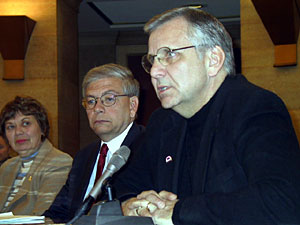Local leaders blast recommendation to cut aid to cities
February 13, 2003
 |
| Duluth Mayor Gary Doty, right; Exececutive Director of the League of Minnesota Cities Jim Miller (center), and Minnetonka Mayor Karen Anderson testify at a Senate Taxes Committee meeting. (MPR Photo/Michael Khoo) |
St. Paul, Minn. — The auditor's report concludes that, on average, cities that receive the largest state aid payments in turn spend the most on a per capita basis. Awada says that suggests local government aid encourages and even rewards cities for funneling dollars into what she calls "non-essential" services. In fact, she says, cities that receive above the median level of LGA funding spend double what other cities spend on such services. That, she says, leads to a basic question of equity.
"Is it appropriate or fair for the state and the taxpayers from all across Minnesota to subsidize a very high level of spending on non-essential services in a few, select communities so that they can have a quality of life that's second to none?" Awada asked.
With the state facing a $4.2 billion deficit over the next two years, Awada suggests a significant portion of the shortfall could be addressed with a roughly $500 million cut in LGA in the next fiscal cycle. Based on her report, she says cities could manage the cuts without any effect on the essential services of public safety, streets and highways, and government administration.
But local government officials say Awada's interpreting the data incorrectly. Duluth Mayor Gary Doty told members of the Senate Taxes Committee that he questions Awada's definition of "non-essential" services. He says many of the city's amenities are crucial for attracting new residents and, just as important, new employers.
"I'm in competition with other states elsewhere, and I have to say them, 'Well, we don't have any arts in our community; we have a library that's closed, and our parks are closed,' what kind of success am I going to have in bringing those jobs to our community? They're not going to consider coming to Duluth. And those are the kinds of services that are considered non-essential," Doty said.
Supporters of LGA reform, however, say regardless of how you define "essential" and "non-essential," there's a basic question of fairness.
Sen. Julianne Ortman, R-Chanhassen, noted that her city receives virtually no LGA dollars. "Our personal income taxes are sent to other communities like Minneapolis. And then we are left without dollars coming in for our essential services, so we must raise that with our local property tax, city and county. So we're paying for ours and we're subsidizing theirs."
Municipal officials, however, say that reasoning doesn't account for the complexities of local government financing. For example, they say, a city may appear to spend more on services simply because it -- unlike a township next door -- doesn't rely on a county or other unit of government to defer its costs.
Minnetonka Mayor Karen Anderson says her suburban community uses almost no LGA. But she says that doesn't mean other muncipalities should be expected to operate likewise. "In Minnetonka we receive library services from the county. We receive our airport and transit services from the metropolitan regional government. Other cities have to provide those services themselves. And to cut cities' LGA because they spend more than my city, just doesn't make sense."
Officials in Gov. Tim Pawlenty's administration say they don't plan to cut LGA funding quite as deep as the auditor's report suggests they could. But revenue commissioner Dan Salamone says the 2004-2005 budget, due next week, will contain significant cuts. He says he expects cities will be able to adjust to reduced aid.
"We're going to be hoping that cities will be making budget adjustments in response to any aid reductions that are going to be proposed. And we're going to try to manage those aid reductions in a way that the impacts are relatively uniform across the state and not unreasonable," he said.
Salamone says in addition to cuts, the administration will offer reforms to the program that he says will target money based on estimates of what cities need to provide services rather than on what they've historically spent.
|
News Headlines
|
Related Subjects
|

